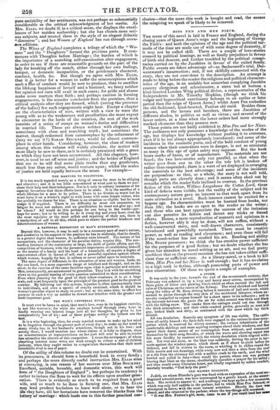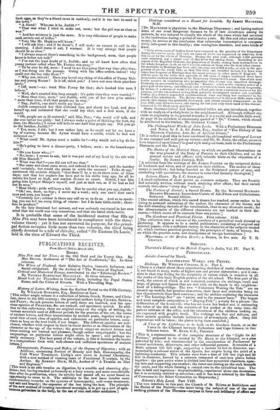MISS PEN AND HER NIECE.
THE scene of this novel is laid in France and England, during the closing years of Queen Anne's reign and the beginning of George the First's : and both the opinions of the age and the political tur- moils of the time are made use of with some degree of dexterity, if it may not be called skill. There are a couple of love-stories crossed by political leanings, as well as family prejudices in favour of birth and descent, and farther troubled by the political conspi- racies carried on by the Jacobites in favour of the exiled family. Public events are taken advantage of—as Sacheverell's trial, Der- wentwater's insurrection • and, if not skilfully connected with the story, they are not overdone in the description. An attempt is made to bring before the reader the religious and political character- istics of the age, in an amiable but somewhat complying Jacobite country clergyman and schoolmaster, a stern but at bottom a kind-hearted London Whig political divine, a representative of the Independents in Mr. Timothy Hopkins, (though we think his vulgar and hypocritical sanctimony belongs to an earlier or later period than the reign of Queen Anne,) whilst Aunt Pen embodies the old-fashioned, kind-hearted, Puritan old maid. Besides these persons, and the heroes and heroines, there are Jacobites of different shades, in politics as well as virtue ; and several of the lower orders, at a time when the lower orders had more strongly marked character than they possess now.
These points are not badly exhibited in Miss Pen and her Niece. The authoress not only possesses a knowledge of the modes of the age, but displays her knowledge without pushing it to extremes, even if it be not always appropriately introduced; and some of the incidents in the romantic parts, and of the bold conduct of young women when their connexions were in danger, is not so unnatural as many in this age of quiet safety may suppose. But the book bears marks of haste, or of manufacture. The materials are not fused; the two love-stories only run parallel, so that when the writer goes from one to the other the tale left is broken of rather than suspended; there is a want of art displayed in arranging the materials to the best advantage; and some of the incidents are purposeless : so that, as a whole the story is not well told, though parts are cleverly done; and it seems often eked out by remarks which the reader feels inclined to overrun. In the previous fiction of this writer, William Langshawe the Cotton Lord, these kind of defects were visible, but the reality of the subject and its contemporary nature gave an interest to that work apart front its mere attraction as a novel. Such interest cannot be excited for a bygone age. Its characteristics must be learned from books, not from life; the books are as open to the reader as the writer; and those who can best appreciate the success of the imitation can also perceive its failure and detect any tricks or forced efforts. Hence, a mere reproduction of manners and opinions in a fiction, however ably it may be done, will not suffice, without a well-constructed story, and well- drawn characters, consistently introduced and powerfully sustained. There must be creative power, as well as reading and cleverness; and even these will fail if the novel-writer has not studied his art. Reading and ability Mrs. STONE possesses ; we think she has creative power sufficient for the purposes of a good fiction ; but we doubt whether she has given her attention to novel-writing as an art, and we feel pretty confident that on the present occasion she has not taken either suffi- cient time or sufficient care. As a library-novel, or a book to kill time, Miss Pen and her Niece is well enough ; but it has no claims to a high rank in fiction, although possessing parts of power and nice observation. Of these we quote a couple of examples.
A STORM.
It was early in the year, towards the end of the seventeenth century, that February was ushered in by a long and heavy snow-storm, accompanied by those gusts of bitter and piercing winds which so often succeed the lull and calm of Christmas on the coasts of the Solway. The wind shrieked and howled along the valley of St. Bees, driving before it torrents of hail and snow, which seemed to pierce through the very skin of the accidental labourer, whom ne- cesssity compelled to expose himself for a short apace to its influence ; and in the intervals between the gusts the air for miles around was thick and black with the falling snow. The smoke from the cottages could not rise through the thick atmosphere ; and their white-washed. gables, generally so neat and gay, looked black and dirty, as contrasted with the snow which lay thick around.
All was desolation. Scarcely any symptom of life was visible. The cattle were all safely housed : the farm-folk were engaged in the various in-door occu- pation which is reserved for wintry seasons ; the various inhabitants of the comfortable shielings and more aspiring cottages closed their windows, and fast barred their doors, secure of no interruption from without, and ensconced themselves by their snug firesides, of which the warm and cheering aspect was felt more forcibly by contrast with the wintry desolation which reigned with- out. Yet ever and anon, as the blast rose suddenly, driving the snow in tor- rents againstagainst the window-panes, which shook as if about to yield before its violence, and fall in shivers in the room, or whirling it in eddies round the little courts and out-housings, while every now and then a slate from the roof or a tile from the chimney fell with a sudden crash to the earth, and the wind howled and yelled in fury—then would the parent, whose son was perhaps
braving that blast on the ocean, shudderingly ejaculate a prayer for his safety; and then would every Christian heart, not wholly engrossed by selfish comfort, mentally breathe, "God help the poor."
OLD MAIDEN DIALOGUE.
Judith, on whom Blanche's gaze was fixed with an expression of the most un- disguised astonishment, was here interrupted by a gentle knock at the street- door. She retired to answer it : and a colloquy was kept up for a few moments, which was only half audible in the parlour, but to which Miss Pen listened, or attempted to listen, with the most earnest attention. Shortly the door was closed, and she returned to the parlour, where the tea-things still remained.
"It was Mrs. Fenton's girl, mem, came to see if you could lend her sews
fresh eggs, am they've a friend come in suddenly, and it is too late to send to the town."
"A friend! Who can it be, Judith ? "
"That was what I tried to make out, mem ; but the girl was as close as wax."
"And her mistress is just the same. It is very ridiculous of people to make such secrets out of trifles."
"Very like Mr. Hopkins will know." "1 will ask him ; and if he doesn't, I will make an excuse to call in the morning. I shall worm it out, I warrant. It is very strange that people should be so close."
"I always suspect there's something in the background, mem, that people know is better not told."
"I've not the least doubt of it, Judith ; and we all know how often that young partner called when Mr. Fenton was away." To be sure he did, Them: I used to ace him going that way time after time, as I was doing out the passage. Going with the office-orders, indeed ! why could not the boy take them ? "
" Why not indeed ! Have you heard any thing of this affair of Fanny Mel- ton and young Stoner? Is it off, think you? I have not seen them pus here lately." "Off, mem !—no: trust Mies Fanny for that ; she's hooked him now, I believe."
" Well, she's courted him long enough : it's quite time they were married." "More than time, mem," said Judith, with one of her own grim smiles; " more than time, if all that people say be true."
" Nay, Judith, you don't really say that—" Judith compressed her thin withered lips, and shook her head, and drew herself up, flea intimated that she could say that, and a deal more, if she would.
"Oh, people are so ill-natured," said Miss Pen ; "the world will talk, and she was rather too giddy : but I always make a point of thinking the best, my dear, (to Blanche,) 1 never will believe one-half that people say. Did you go to the butcher, Judith ?"
" Yes, mem, I did; but I was rather late, so he could not let me have a leg of mutton, because Mr. Ayton would have a saddle, which he had not reckoned on."
"What could Mr. Ayton want a saddle for ?—why would not a leg do for him?"
"lie's going to have a dinner-party, I believe, Them; so the housekeeper said."
"Do you know when ? " "No, Them; I meant to ask, but it was put out of my head by the stir with old Miss Macroft."
"What was that ?—you did not tell me that." "She came and chose some meat, and ordered it to be sent ; and the butcher said 'certainly, but would she please to settle the account.' Folks do say," continued the amiable Abigail, "that there'll be a to-do there some of these days; and that her nephew has been put to his shifts long ago, for all he carries his head so high, and madam dresses so smart. Indeed, I saw him going into Lawyer Sharpe's myself, and just at dark too, as if he had as lief not be seen."
"Most likely: pride will have a fall. But be careful what you say, Judith." "Oh ! me, mem' no fear; I never say a word; only one can't shut one's eyes and ears, you know."
"Certainly not ; neither is there any call on us to do so. And as to speak- ing, you can tell me every thing, of course: but I do hate tittle-tattle; there- fore be prudent." So the lady dismissed her servant, and was seriously cotvinced in her own mind that the world was very censorious, and that she hated tittle-tattle.
It is probable that some of the incidental matter that fills up Miss Pen may have been introduced in compliance with the three- volume theory : yet it has not answered its purpose, for the princi- pal fiction occupies little more than two volumes, the third being chiefly devoted to a tale of chivalry, called " Sir Eustace De Lucie, laid in the time of Edward the Third.



























 Previous page
Previous page